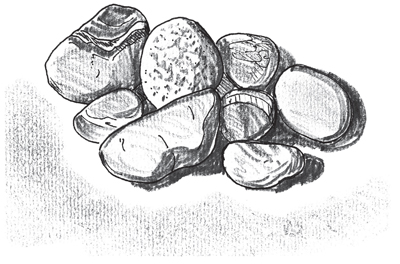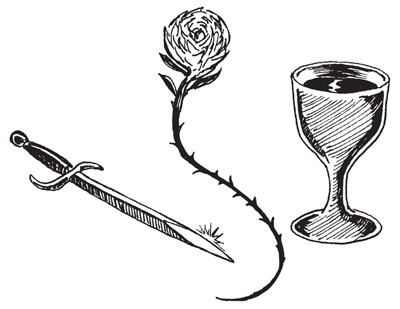Oxfordshire Folktales (13 page)
Read Oxfordshire Folktales Online
Authors: Kevan Manwaring

![]()
This bloodthirsty tale is made even more thrilling for being true. Whether the saying about ‘any old Tom, Dick or Harry’ originated from it, who knows? Of course, there are more famous highwaymen, chief amongst them Dick Turpin, whose story was transformed by popular culture; but the reality was far less glamorous and travellers would cross the Wychwood Forest at their peril. These days, there are fewer past-times more pleasant than a day out in the Cotswolds, exploring the back lanes and stopping at charming country pubs – such as the Bird in Hand pub at White Oak Green: the location of the original Habbergallows perhaps?
M
OLLIE
AND
THE
C
APTAIN

The elegant town of Henley-on-Thames, home of the famous Regatta – the epitome of respectable Middle England – is the last place you would expect to find a crime of passion occurring. It is simply not the place where people rock the boat – let alone murder their loved ones, but that is what happened in the summer of 1751.
Blandy, the Town Clerk of Henley, had a daughter, Mary (or Mollie, as she was known) who made up in dowry what she lacked in physical charm. Mollie was now twenty-six and still unmarried – for the times, practically over the hill – because her father had been ‘choosy’ for her, only wanting the best (or the richest). Until her father found her a ‘suitable suitor’ Mollie would remain un-worshipped.
Finally, when they had all but given up, they thought they had found a match, thanks to the help of a General Kerr.
Kerr introduced them to ‘Captain, the Honourable’ William Cranstoun, descended from a Scottish peer: forty-six, unhandsome, pock-marked, small – yet he had a certain charm of manner and a title. So, despite being impoverished this didn’t put Blandy off and was pleased when Cranstoun showed interest in Mollie.
The Captain, stationed in Henley, became a frequent visitor to the Blandys as he set to wooing Mollie. She was not unwilling. Mrs Blandy was happy with the courtship – of ill health, she wanted her daughter wed to an eligible suitor and bearing her grandchildren before she shuffled off this mortal coil.
However, there was a catch.
Kerr discovered Cranstoun was already married to a certain Anne Murray in Edinburgh! Because she was a Catholic and the daughter of a Jacobite family, Cranstoun had kept the marriage a secret to avoid it affecting his chances of promotion. When he had been ordered south, his wife returned to her family home, with their daughter.
You can imagine the heated conversations in the Blandy household when this revelation was discovered. It looked like Mollie’s hopes of love were doomed – for she did love him, despite everything. After all, he had given her a brooch made of Scottish pebbles, declaring his love for her.
Cranstown somehow managed to persuade the Blandys that he wanted the marriage annulled and was optimistic that this would happen soon.
Then tragedy struck. Mrs Blandy died. Mr Blandy was beside himself with grief.
Cranstoun was recalled for duty to Scotland but Mollie still did not give up on her suitor. Mr Blandy felt differently. Was the Captain a fortune hunter? He forbade Mollie to have anything more to do with Cranstoun but, alas, he was too deep in her heart.
Cranstoun sent Mollie a gift of some white powder, apparently to ‘clean the pebbles’. It was, in fact, a ‘love potion’, as he put it, which would ‘soften her father’s heart’. All she needed to do was add it in secret quantities to his food. Mollie agreed – so blindly was she in love. Mr Blandy’s health deteriorated rapidly, for Mollie was unwittingly poisoning her father with arsenic! When they realised the truth she was as distraught as he. In floods of tears, Mollie confessed all to her dying father and with his last breath he forgave her.
The court and the folk of Henley were less forgiving about the murder of their Town Clerk.
When the doctor came to examine Blandy and announced the verdict of death by suspicious circumstances, Mollie gave him the slip. The doctor raised a hue and cry and soon a mob was hounding for Mollie’s blood as she raced along the streets of respectable Henley.
Heart pounding, Mollie raced towards the river bridge, under which stoically flowed Old Father Thames – whose banks had bore witness to many tragedies. For a moment she considered throwing herself into his cold embrace. What had life brought her but misery? Both her parents were dead and her lover – what nature of man or devil was he?
Seeing the pathetic figure of Mollie weeping by the riverbank, the landlady of The Angel public house took pity on her and gave her shelter from the mob. Lord knows what might have happened if they had lain their hands on her in the midst of their frenzy. But when the Justices of the Peace arrived, she was finally apprehended and brought to justice.
Mary Blandy was put on trail for the murder of her father on 29th of February 1752. She pleaded innocence – claiming she did not know the true nature of the powder given to her by the Captain. She listened stony-faced to her accusers and to her sentence – to be hanged by the neck until she was dead. Some took her lack of expression as evidence of her guilt, but there were many there who thought otherwise. It was clear to all who knew her how much she had loved her father. And who has not been made a fool of by love?
Awaiting her execution she was given privileges and her friends came to visit her. Many remarked at the stoic grace with which she calmly accepted her fate. Then, on 6th of April 1752, she was hanged until she was dead. The young virginal body of the late Ms Blandy was buried at midnight in the local church, between her parents. Despite the late hour, many came to witness the sad end of Mary. A lot of people believed her innocent of poisoning her father – a victim of the so-called ‘Captain, the Honourable’.
As for the cad Cranstoun – he fled to the Continent, to the Flemish town of Furnes, where he died in agony in December … apparently poisoned by arsenic. By whom, remains a mystery. Was it Kerr? A citizen of Henley? Another spurned lover? Perhaps justice was delivered after all – in a dish served up cold.
![]()
This heartbreaking tale is a true story. The trial and execution of Mary Blandy was recorded at the time, and a moving contemporary account of the execution appeared as Appendix VII of William Roughead’s
Trial of Mary Blandy
(1914). The location of her execution was either the Westgate prison mound or in the Castle Yard in Oxford – both of which are very close to each other. According to folklore, a blackbird was perched on the gallows during her execution and from that date no blackbird has been heard to sing in that vicinity. It is hard to imagine such a scandalous crime happening in the pleasant river-town of Henley-on-Thames, but it just goes to show that you can never judge by appearances!
F
AIR
R
OSAMUND
'
S
B
OWER

From the moment he laid eyes upon her he had to have her. It was as simple as that. Henry II was known for his liking of the ladies â his wife, Eleanor of Aquitaine, certainly knew â but he had never beheld such a beauty before as the aptly named Rosamund: the rose of the world.
The daughter of the marcher lord, Walter de Clifford, and his wife Margaret Isobel de Tosny, Rosamund grew up in the wooded folds of the Wye Valley, in Clifford Castle. Seemingly protected from the world by the winding gorge, it was a fairytale place to spend a childhood â but childhood must come to an end. And one day, when Rosamund was in the bloom of her young womanhood, it did, when the King passed by her father's castle during one of his campaigns against the troublesome Welsh. There always seemed to be a rebellion to quell in those days.
It was Christmas and it was Clifford's duty to entertain the King. And Henry was in the mood for merry-making. His wife had given birth to John, who was to be their last child, on Christmas day. Their marriage had soured after many children and many affairs. It was a familiar pattern. The screaming, smelly baby; the moody, mardy wife; the claustrophobia of court â he had to get away. Even dealing with surly rebels in the damp Welsh valleys was more appealing than being stuck at home.
Rosamund had the most beautiful hair he had ever beheld â long and soft and fair. Her skin was as pale as milk; her eyes as bright as morning. She was the stuff of troubadour songs. While Henry was entertained in Clifford's hall, he couldn't take his eyes from her, she was so graceful. Clifford noticed Henry's attentions and knew his reputation, but he did not raise a finger to prevent what was happening, instead adding kindling to a fire. It was inevitable; perhaps he thought it would be advantageous. His daughter, the sweetheart of the King â just imagine â it would win him favour and gain him influence. Little did he know what unhappiness it would bring to them all.
Henry wooed Rosamund and she did not resist. The monarch could be wildly romantic. He had fashioned the grounds of Woodstock after the tale of Tristan and Isolde. There he had a picturesque bower made for Rosamund â a fairytale palace, hidden within a labyrinth. To this romantic fastness, away from the eyes of the world, he would come in secret, showering her with gifts and the sweet nothings of the heart. He talked of how there was no love in his marriage anymore, how Eleanor was ambitious and cold. Her only appetite was for information, land and allies. She was respected and feared across Europe â the most powerful woman of the age. She was eleven years older than Henry and they had been together for fifteen years. She has borne him children, as a dutiful wife â heirs to the throne no less â but her husband's wayward nature had proven too much, and she moved back to Poitiers, taking half the court with her. The Royal marriage bed was empty. No wonder Henry's eye was roving â so he reasoned to Rosamund.
But other eyes were also watching. Eleanor's spies. They noticed the King going back and forth into the bower, hidden in the âwilderness' of Woodstock, which he had filled with leopards and lions to enhance the effect. They reported this to Eleanor, who had been staying at Beaumont Palace, near Oxford, where she had given birth to John. The Queen went there herself to investigate, leaving her babe with the Royal wet nurse.
